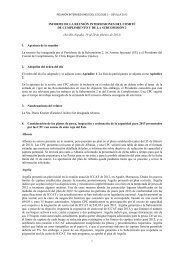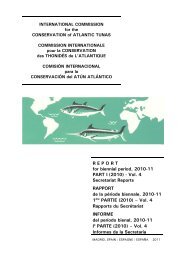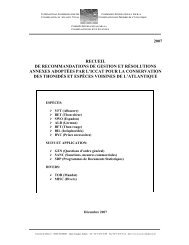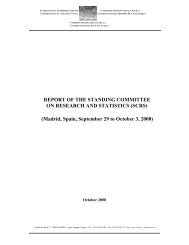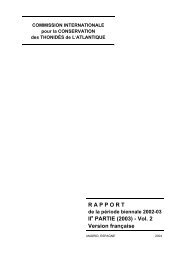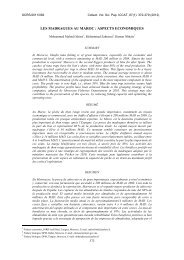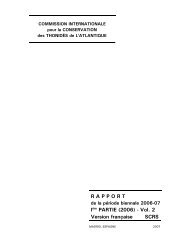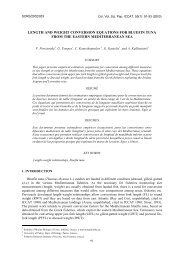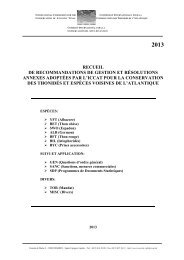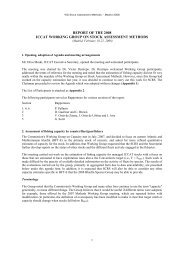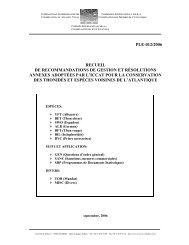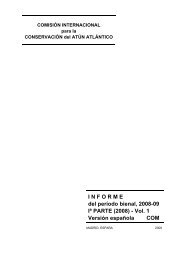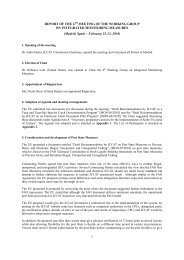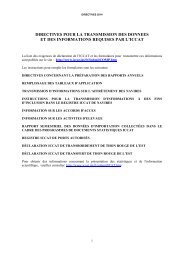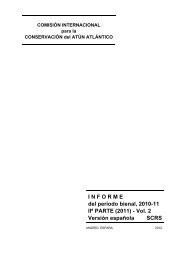E - Iccat
E - Iccat
E - Iccat
You also want an ePaper? Increase the reach of your titles
YUMPU automatically turns print PDFs into web optimized ePapers that Google loves.
ICCAT REPORT 2012-2013 (I)<br />
ANNEX 7<br />
OTHER DECISIONS ADOPTED BY ICCAT IN 2012<br />
7.1 MODIFICATION OF RULE 9 OF THE ICCAT RULES OF PROCEDURE IN RESPECT OF INTER-<br />
SESSIONAL VOTING<br />
Intersessional votes at ICCAT have become more common. Recent examples have shown that a high proportion<br />
of Parties not responding in an intersessional vote may have a determining outcome on a decision. Under the<br />
current Rules of Procedure, an omission to vote is recorded as an abstention and, as such, has the same effect as<br />
a vote against a proposal. While modifying the quorum, the majority or how abstentions are counted in a vote<br />
might require an amendment to ICCAT’s Convention, modifications could be made to Rule 9 (Voting) of<br />
ICCAT’s Rules of Procedure to improve the intersessional voting process.<br />
A) Objectives and outcomes of the proposal<br />
The proposal to modify Rule 9 of the Rules of Procedure seeks to encourage greater participation in<br />
intersessional votes by members of the Commission by providing additional steps throughout the process to<br />
remind members of the need to respond to an intersessional vote and to provide members with extra time, in<br />
exceptional circumstances, in order to submit their vote.<br />
Under paragraph 14 of Rule 9 of the Rules of Procedure, members have 40 days to respond to an intersessional<br />
vote, either with an affirmative vote, a negative vote, an indication of their abstention or a request for additional<br />
time for voting, in which case a further 30 days shall be allowed from the expiration of the initial 40-day period.<br />
In the event of an extension, the Executive Secretary has to inform all members of the final date by which<br />
responses must be received. Aside from this information, the Executive Secretary is not required to communicate<br />
with the members during the 40 or 70-day voting period.<br />
To encourage members to respect the need to respond to an intersessional vote, it is proposed that Rule 9 be<br />
modified to require additional communications by the Executive Secretary to the members at various stages of<br />
the process:<br />
− In paragraph 13 of Rule 9, if no request for an intersessional vote on the chairman’s determination has been<br />
received after 10 days, the Executive Secretary informs the members and reminds them of the number of<br />
days left to respond to the initial proposal.<br />
− 10 days before the end of the initial voting period, if no request for an extension of time has been received,<br />
the Executive Secretary informs the members of the approaching expiration of the 40-day period, reminds<br />
them of the need to respond and could identify the members whose responses have not yet been received.<br />
− In paragraph 14 of Rule 9, the Executive Secretary when informing the members of the final date by which<br />
responses must be received after an extension could identify the members whose responses have not yet been<br />
received.<br />
In order to contribute to achieving quorum for intersessional votes, a new paragraph 14bis is proposed which<br />
gives the Chair the ability, in exceptional circumstances, to extend the voting period for an additional 30 day<br />
period.<br />
B) Possible drafting suggestions<br />
13. Within 10 days of the initial transmittal of a proposal pursuant to paragraph 11 (a), in accordance with Rule<br />
7(d), any member may request an intersessional vote on the chairman’s determination of the necessity of<br />
considering the proposal intersessionally made under paragraph 9, to be subject to the majority decision<br />
rule contained in paragraph 2. If no such request is received, the Executive Secretary shall inform all<br />
members and indicate the number of days remaining to respond to the proposal.<br />
14. Members shall respond within 40 days of the date of the initial transmittal of a proposal or request,<br />
indicating whether they cast an affirmative vote, cast a negative vote, abstain from voting, or require<br />
216



